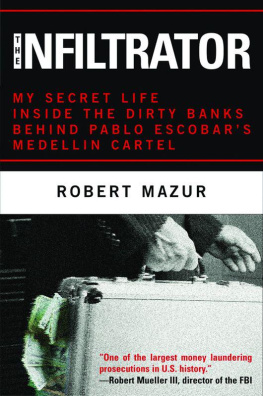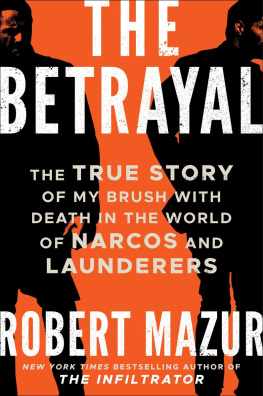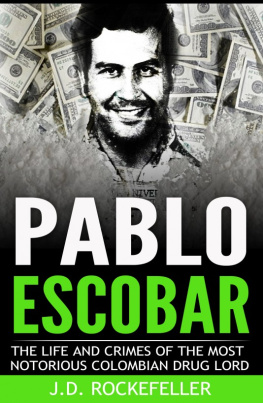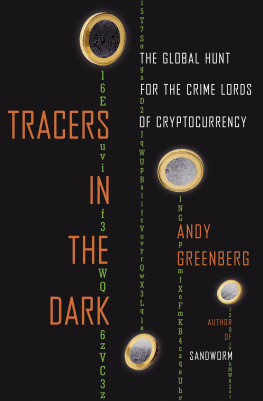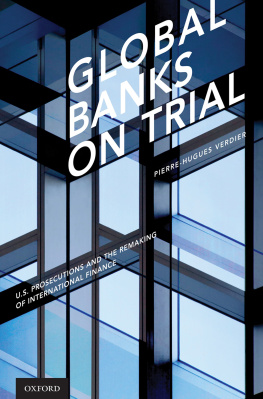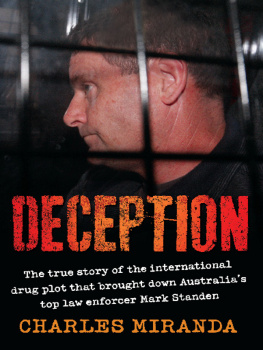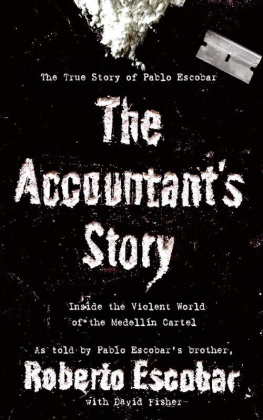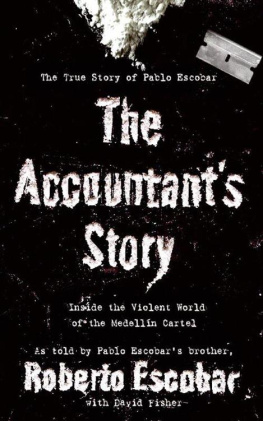Copyright 2009 by Robert Mazur
All rights reserved. Except as permitted under the U.S. Copyright Act of 1976, no part of this publication may be reproduced, distributed, or transmitted in any form or by any means, or stored in a database or retrieval system, without the prior written permission of the publisher.
Little, Brown and Company
Hachette Book Group
237 Park Avenue, New York, NY 10017
Visit our website at www.HachetteBookGroup.com
www.twitter.com/littlebrown
First eBook Edition: July 2009
Little, Brown and Company is a division of Hachette Book Group, Inc. The Little, Brown name and logo are trademarks of Hachette Book Group, Inc.
Some names and identifying characteristics have been changed to protect confidentiality.
ISBN: 978-0-316-08037-8
CONTENTS
To Evelyn, my wife, whose love and support
are more than I deserve
U.S. District Court, Tampa, Florida
March 26, 1990
ARMED GUARDS LED ME into a tiny, windowless room in Tampas U.S. District Courthouse. Through the glossy mahogany walls came the muffled voices of lawyers arguing and the response of an unruly crowd. On the other side of the door, I was about to do battle with some of the best defense attorneys money could buy. For the first time since the unmasking of Bob Musellamy cover as an international money laundererhalf a dozen men who had come to realize that I wasnt really one of them were about to lay eyes on me.
As the minutes dragged, I gathered strength for the fight ahead by thinking of my wife and children, who had spent years enduring the hardships of my career. With the operation over, we all looked forward to returning to life as it had been, only to learn that some of the eighty-five men charged in the first wave of indictments had put a $500,000 contract on my head. My family and I had relocated and were living under an assumed name, but I wouldnt be able to live with myself if my role in taking down cartels and their bankers brought any harm to those I loved. The hard work and anguish of the last four years would have meant nothing. I needed every ounce of strength and determination I could muster to get through the next three months on the witness stand.
Theyre ready for you now, said a deputy U.S. marshal, opening the door and breaking my reverie. He led me into a courtroom jammed with hundreds of reporters and spectatorsand also the wives and children of the defendants with whom I had spent so much time. They said nothing, but their faces all screamed, How could you? On the courtroom floor, the six defendants huddled among a constellation of lawyers.
Rudy Armbrecht, a major organizer for the Medelln cartel, had worked with the entire cartel commission to arrange some of their most sensitive operations in the U.S. If they needed to buy fleets of aircraft or assess the feasibility of global laundering schemes, they called on Rudy. He looked like a crazed Jack Nicholson, but he had the extraordinary intelligence and philosophical bent of Hannibal Lecter. Pablo Escobar had hand-picked Armbrechts boss, Gerardo Moncadaalso known as Don Chepeto control a large part of his cocaine empire. Armbrecht had acted as a conduit between me, Don Chepe, and Escobar. As I glanced toward him from the stand, Armbrecht grabbed his tie and, with a demented look on his face, waved it at me to say hello.
Near Armbrecht sat Amjad Awan, a smooth-as-silk senior executive of the Bank of Credit and Commerce International (BCCI) who laundered money for some of the most notorious criminals in the world. His clients included President Muhammad Zia of Pakistan, General Manuel Noriega of Panama, and high-ranking drug dealers in the U.S. The son of the former head of the ISIPakistans equivalent of the CIAAwan supported a group then known as the Afghan Freedom Fighters, known now as the Taliban. Awan held himself above stunts like waving his tie. In his impeccably tailored suit, he tilted his head forward and looked down his nose as though he were royalty annoyed by my presence.
Sitting beside Awan was his best friend and co-marketer at BCCI, Akbar Bilgrami, who shared responsibility with Awan to develop business for BCCI in all of Latin America, where they openly sought relationships with the owners of any dirty money they could find. Born and raised in Islamabad, Bilgrami spoke fluent Spanish and had spent long stretches of his career in Colombia, where he met his third wife. Bilgrami stared me down, fidgeting in his seat and rubbing his hands together. Even when I was under-cover, I had trouble putting him at ease. No doubt he knew this day would come.
Ian Howard, a BCCI officer born in India, ran the Paris branch of the bank, doing the dirty work for his boss, Nazir Chinoy. The third-highest-ranking executive in a 19,000-employee bank, Chinoy directed all European and North African branches. After I won Chinoys confidence in Paris, he brought Howard into our schemes. Chinoy would have been sitting in the courtroom, too, had he not been fighting extradition in London, where authorities there had arrested him and were holding him without bond. The old London jail in which he was languishing made most U.S. prisons look like four-star hotels. His minion Howard glared at me, but neither his face nor his body moved.
Also from Paris, Howards right-hand man Sibte Hassan found himself tangled in the web of our undercover operation. Hassans was the hand that pushed money around the globe wherever Chinoy directed. Younger and less experienced than his colleagues, Hassan had never set foot in the U.S. before his arrest. His dependence on his superiors carried through even to the courtroom. He kept glancing at the other defendants, looking to see how he should act.
Last in the line-up came Syed Hussain, a BCCI account executive in the Panama branch. Hussain saw in me an easy means of meeting the banks pressure to bring in any kind of money, as long as it increased the bottom line of the balance sheet. When agents arrested Hussain, he was on his way to what he thought was my bachelor party. As the cuffs clicked around his wrists, he laughed. Surprised, the arresting agents asked him what was so funny. Ive been to bachelor parties like this when women dress up like cops and act like they are arresting you, he said, laughing. Where are the women? The agents shook their heads, and said, Pal, you need to wake up and smell the coffee. This isnt make-believe. Your ass is under arrest.
I spent years undercover as a money launderer to the international underworld, infiltrating the apex of a criminal hierarchy safeguarded by a circle of dirty bankers and businessmen who quietly shape power across the globe. They knew me as Bob Musella, a wealthy, mob- connected American businessman also living the good life. We partied in $1, 000-per-night hotel suites, lived in lavish homes, drove Rolls-Royce convertibles, and flew on the Concorde and in private jets. Bob Musella was their kind of guy. Bob Musella ran a successful investment company, had an interest in a Wall Street brokerage firm, operated a chain of jewelry storeshe had it all. What they didnt know was that I wasnt really Bob Musella. That name and lifestyle were a lie I lived solely to gain access to their secret lives in the criminal underworld.
Under my Armani suits or in my Renwick briefcase, mini recorders captured the damning evidence of our partnerships in crime, which I then passed to my government handlers. After a dramatic takedown staged at a fake wedding (mine), more than forty men and women were arrested, found guilty, and sent to prison. In the year and a half between the end of the operation and the start of the first trial, a handful of dedicated agents and I put in eighteen-hour days feverishly transcribing more than 1,400 clandestine recordings. Those microcassettes became knockout punches in the trials ahead, and Operation C-Chase became one of the most successful under-cover operations in the history of U.S. law enforcement.
Next page
